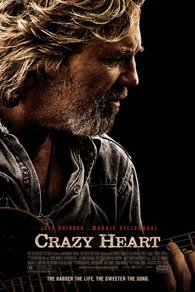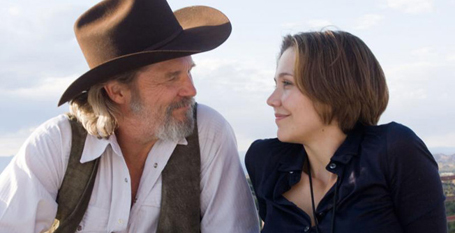
But there’s a huge difference because it’s Jeff Bridges (The Big Lebowski) singing in a weather-beaten voice and playing a mean guitar, and distilling the wild, hard men of country into a character fittingly called Bad Blake. Quite near his retirement age, Bad is broke, his career is nowhere despite his talent, and he’s reduced to the C grade circuit, performing gigs in bowling alleys, staying in cheap motels, having sad one-night stands and slowly drinking himself to the grave even as his brightest protege (Colin Farrell) reaches superstardom.
Now, why watch something brilliant twice, even if it’s extremely well-made? I contend that Crazy Heart puts a very fresh spin on a very old story, and that this fresh spin is completely justified and integrated into heart and soul of country music, which this movie serves as a primer to.
Simply put, wrestling (in the world of The Wrestler) is an entertainment sport that doesn’t demand real talent, given the ‘worked’ quality of its matches. The tragedy of Mickey Rourke’s protagonist is an existential one sharpened by the pathos of his professional and personal incompetence and the make-believe quality of his vocation. Country music – singing and composition alike – is an art and a craft whose practitioners need an actual amount of talent that would be utterly destroyed if they go beyond a certain point in their hard living.
There cannot be a fully dramatic narrative for the decline and fall of a country singer. Like it or not, in this industry, the victories are always biter-sweet and the falls are always bad enough to hurt, yet not bad enough to kill, but still bad enough to inspire a song or two about regrets. Now, run that through a movie, and you’ll get a mellow tale that breaks all the rules we’ve been told about the sacred three-act dramatic structure. But what you’ll get is a tale that’s truer to life than a three-act structure, and one that leaves you will a satisfied buzz at the end.

